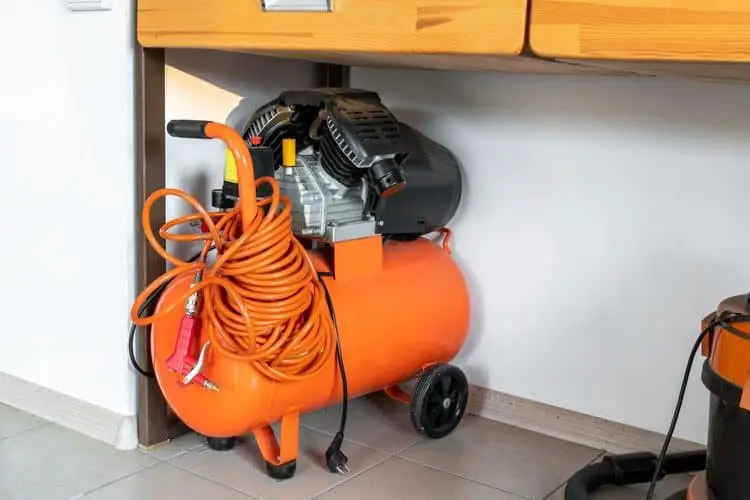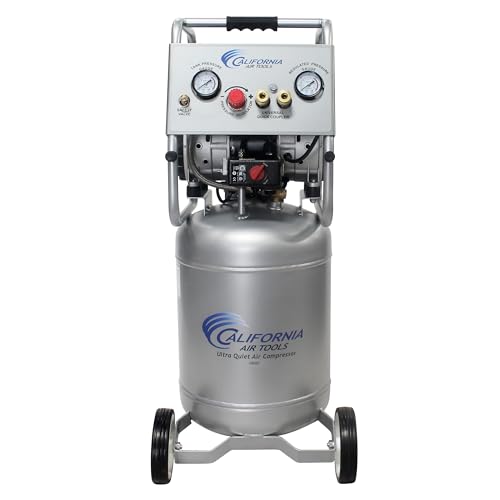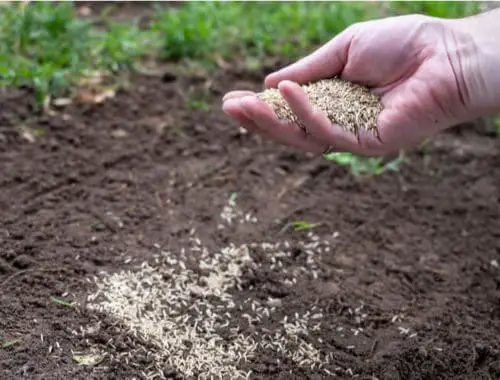Air compressors for a home garage can be useful for a variety of tasks. From filling tires with air to powering tools, the high-pressure zone of compressed air that comes with having an air compressor on hand will go a long way to making your life easier.
Our expert reviewed dozens of different air compressor options to find the best of the best and based his choices on criteria including tank capacity, how loud they run, and the overall quality and customer feedback on the products. The Industrial Air IL1682066.MN came out as the top pick for its ability to deliver fantastic performance consistently on the job. With a 20-gallon tank capacity, ample power, and even a nice design, it’s a great choice.
Our Expert’s Top 5 Air Compressors for a Home Garage
Here are the picks from our expert. Compare the ratings and features of different models.
| Editor’s Picks | Brand | Rating | Tank Capacity | Decibels | Max PSI | CFM at 90 PSI |
|---|---|---|---|---|---|---|
| Best Overall | Industrial Air IL1682066.MN | 20 Gallons | 70 dB | 135 PSI | 5.3 | |
| Best Budget Buy | California Air Tools 10020C | 10 Gallons | 70 dB | 125 PSI | 5.3 | |
| Best High Capacity | Ingersoll-Rand SS3F2-GM Garage Mate | 30 Gallons | 80 dB | 135 PSI | 5.7 | |
| Best Low Noise | Stealth SAQ-12018 | 20 Gallons | 68 dB | 150 PSI | 5.0 | |
| Best Portable | Porter-Cable C2002 | 6 Gallons | 82 dB | 150 PSI | 2.6 |
*Ratings are on a scale of 1 to 5 and based on reviews, feedback, and opinions of actual customers
In This Article
Who Should Buy an Air Compressor
- Bike/vehicle owners – An air compressor will be handy for filling up tires on bikes and vehicles.
- Homeowners with driveways/pools – Power your pressure washer with your air compressor and keep things looking clean.
- Clean freaks – Use your air compressor to tidy up and clean your home and garage by blowing debris and dust from hard-to-reach places.
- Do-it-yourselfers – Homeowners who use pneumatic tools around the house or for DIY projects will get a lot of use out of an air compressor.
Who Should Not Buy an Air Compressor
- Apartment dwellers – Chances are it will be too loud for your neighbors and storing it might be a problem.
- People without vehicles, tools, etc. – If you have nothing to plug into the air compressor, chances are you don’t need it.
Research Tips from an Expert
As an expert, I often get asked about how to choose a good air compressor. Here are some tips and best practices to keep in mind when considering this kind of purchase. Be sure to do adequate research on the product you’re considering to make sure it has the key features you need. And whenever possible, consult someone who’s already purchased an air compressor to find out what they like, or don’t like, about theirs.
- Look for an air compressor that can handle adequate air pressure (PSI) – Air pressure is rated in pounds per square inch or PSI. If you want to power tools with your air compressor, you’ll need at least 70 to 90 PSI to do so, and it’s a good idea to opt for an air compressor that can handle more PSI than you need.1 Keep this in mind if that’s your intention.
- Check the cubic feet per minute (CFM) rating – The volume of air that an air compressor makes is rated in cubic feet per minute (CFM). Generally, tools designed to be used with air compressors require about 5 CFM at 70 to 90 PSI, although these requirements can vary significantly. Larger tools used with stationary systems can require 10 CFM or more.2 Always look at the rating given for 90 PSI to determine if your tools will run with that model.
- Choose the right tank size – The larger the tank, the more air you’ll have stored for the job. In some situations, this can be advantageous.
- Consider the decibel rating – How loud is your air compressor? This can make a big difference if you live close to your neighbors who might not appreciate a lot of noise. Most air compressors operate somewhere between 40 and 100 dB, but that’s quite a difference in noise level. The higher the dB rating, the louder the air compressor is.3
How Much Do They Cost?
Between $150 and $900
For most air compressors that you’ll use at home and keep in your garage, you can expect to pay between $150-$900 depending on its features and power. In this way, you really need to consider the specifications and what you’ll use it for. By spending more money, you’ll be increasing the versatility of your air compressor and its ability to function with a variety of accessories. However, not everyone needs their air compressor to perform in such ways. This is why knowing what you’ll use it for is a good idea before investing.
Our Methodology: Why Trust Home Life Daily
As an expert in the field, I’ve not only looked at the products but also spoken to the people who have bought air compressors in the past. This first-hand knowledge has given me special insight and a lot of information. Many of the products were chosen based on not only that information, but also special consideration of the features these air compressors have. Reliability and performance were determined by looking at manufacturer claims and comparing them to real-world performance. You want an air compressor that will fulfill your needs, and that’s why we’ve found some great options for you.
The Best Air Compressors for a Home Garage: Full Reviews
The Industrial Air IL1682066.MN is capable of a max PSI of 135. The 1.6 HP, dual-Voltage induction motor is wired for a standard 120-Volt outlet and convertible to 240-Volt applications. The cast-iron, 20 gallon, vertical tank is thermally stable and has a one-piece casting for a quality seal.
It uses a v-twin cylinder, oil-lubricated pump with belt drive technology with a heavy-duty induction motor that allows for maximum performance and efficiency. The pneumatic tires make it easy to move around your garage or property to wherever you may need it.
- Simple to set up/use
- More powerful than similar models in its class
- Pneumatic tires for portability
- Heavy if moving around a lot
- Can run hot
The relatively compact California Air Tools 10020C features a 10-gallon tank and an oil-free pump that will continue to save you money by requiring less maintenance and associated costs. It runs fairly quietly and still has good power for its size.
The cast aluminum cylinder sits on two wheels for easy movement around your workspace. It comes equipped with two pressure control gauges, and it only takes 120 seconds to fill the tank from empty.
- Oil-free
- Easy to start in cold weather
- Holds air for weeks
- Reports of welding slag that causes noise
- Fittings can be difficult to deal with
The Ingersoll-Rand SS3F2-GM Garage Mate is a great pick if you are looking for an air compressor for home use or around your property that comes equipped with a large 30-gallon tank for high capacity. The 100% cast iron cylinder and frame are sturdy and won’t let you down, while the heavy-duty ergonomic handle makes this hot dog compressor moveable.
You can rely on this unit for continuous operation with All Season Select synthetic lubricant that increases efficiency. It features a 2 horsepower engine that delivers up to 135 PSI maximum operating pressure that you can use for nail guns, paint sprayers, sanders, and more.
- User friendly
- Excellent longevity
- Very powerful
- Oil sold separately
- Price point
The Stealth SAQ-12018 features an innovative quiet system that has been tested to be up to 80% quieter than standard induction motors, with a working noise of only 68 dB. It can support a variety of uses including inflation, finishing nailer, angle grinder, impact wrenches, drills, hammers, chisels, sanders, polishers, and more.
The heavy-duty 20-gallon tank sits on 8-inch rubber reinforced wheels to bring it where you need it. It is also designed to support cold-weather starting without any hassles.
- Quiet
- Solid build/frame
- Quick recovery
- Manual activated drain valve (not auto as stated)
- Unclear instruction manual
Look no further than the Porter-Cable C2002 if you need a small unit that is portable around your home and property, but also easy to grab and go with. Weighing only 34 lbs. it features a 6-gallon pancake-style tank that has a drain valve and rubber feet.
The low amp 120V motor starts easily in cold weather or with an extension cord, increasing its usefulness. You’ll find tons of uses for this small, portable air compressor around your home.
- Quick recovery time
- Oil-free pump
- Lightweight
- Low CFM
- Instructions unclear about break-in: it’s needed!
Frequently Asked Questions
Can you store an air compressor in the garage?
Is a 150 PSI air compressor good?
Can an air compressor get rained on?
Should I store an air compressor full?
Article Sources
Home Life Daily uses only high-quality sources, including peer-reviewed studies, to support the facts within our articles. Read our editorial process to learn more about how we fact-check and keep our content accurate, reliable, and trustworthy.
- Rolair. Under Pressure – PSI, CFM & Air Fittings Explained. Rolair.com. Published July 16, 2018. Accessed August 12, 2021.
- Quincy Compressor. How do I Know How Much Pressure I Need for a Given Situation? Quincycompressor.com. Published April 22, 2020. Accessed August 12, 2021.
- Chicago Pneumatic. How loud is an Air Compressor? Cp.com. Accessed August 12, 2021.
- Taylor B. Keeping Your Air Compressor Running in Cold Weather. Fluidairedynamics.com. Updated October 12, 2020. Accessed August 12, 2021.
- Quincy Compressor. Full Guide to Air Compressor Condensation and Moisture. Qunicycompressor.com. Published April 23, 2020. Accessed August 12, 2021.















